We do not breed Scottish Folds, and we never will. Ever. Find out why...
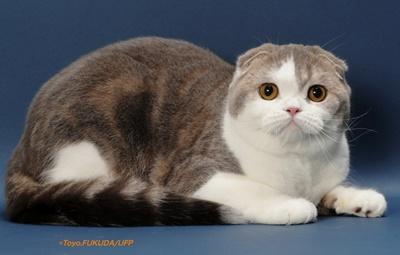
Scottish Folds are incredibly cute, cuddly looking cats...on first sight...but look more closely at what creates those ‘cute’ folded ears and a very worrying picture starts to emerge. Scottish Fold cats are very similar to British Shorthair cats, and some breeders choose to have both straight eared and folded eared cats. We do not breed Scottish Folds, and we never will. Read on to find out why.
What is a Scottish Fold?
A Scottish Fold cat is a cat that looks just like a British Shorthair, but with one difference: the ears are folded forwards:
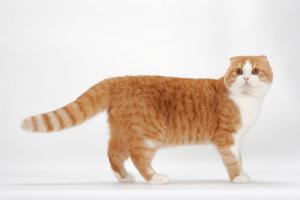
Origins of the Scottish Fold
The first Scottish Fold cat was a white domestic barn cat called Susie. Susie was found in Perthshire, Scotland in 1961. Her ears were very unusual, because they were literally folded in the middle, rather than standing up straight as a cats ears should. That is why these cats are called Scottish Folds. Susie had kittens, and two of her kittens had the same folded ears. By chance, a neighbour to the farm was William Ross who just happened to be a cat breeder with the GCCF (the Governing Council of the Cat fancy). He registered the breed with the GCCF in 1966 and, with the help of geneticist Pat Turner, developed the breed we now know as the Scottish Fold.
Their breeding programme produced 76 kittens in three years. Of those, 42 had folded ears and 34 had straight ears. This led them to believe that the folded ears were the result of a dominant gene. All Scottish Fold cats have ancestry that can be traced back to Susie.
The breed was developed using British Shorthairs and American Shorthairs.
Why do Scottish Folds' ears fold?
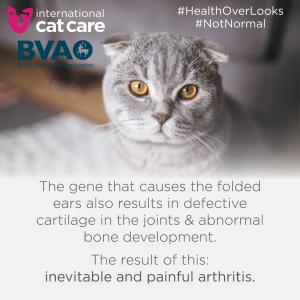
The cause of the fold in the ears is a dominant genetic mutation. This genetic mutation affects the cat’s cartilage. All Scottish Folds with folded ears have osteochondrodysplasia. This is an abnormality that affects the development of bone and cartilage throughout their entire bodies. This is what causes the fold in the ears, but it also causes many other issues that cannot be so easily seen. Any cat that has 2 copies of this gene, will have severe malformed bone structures and painful degenerative joint disease at an early age. Those cats that have only one copy of the gene will all also be affected, but usually to a lesser extent. This is why two cats with folded ears should never be bred together. But even cats with one folded eared parent will suffer.
Neither the GCCF nor FiFe recognise Scottish Folds because of the pain and suffering that these cats experience. Some Scottish Fold breeders argue that breeding a folded cat to a non folded cat can produce healthy offspring, but over 300 breeders were offered the opportunity to have their cats x-rayed, free of charge, to prove this theory, and not a single breeder took up the offer. Their refusal speaks volumes: clearly they were not confident about their cats’ health...or to put it another way, they know that their cats are unwell and suffering.
Scottish Folds Update:
2020: Austria has banned the breeding of Scottish Folds because of the health problems they suffer.
June 2021: The Flemish region of Belgium has completely banned the breeding of Scottish Fold cats. This is a very welcome move and no doubt more countries will follow suit as people become more aware of the serious health issues these cats are born to suffer from.
2021: Scotland is also consulting on the issue and considering banning the breeding of Scottish Folds.
Scottish Fold Health Problems
It has now been proven beyond doubt that all Scottish Fold cats suffer from pain, limb abnormalities and injuries. Charities in the UK are now campaigning for this breed to be completely banned. We support this campaign. Scottish Folds have been found to suffer from:
-
Deformed limbs
-
Shortened limbs
-
Extreme pain
-
Stiff joints
-
Fused bones
-
Reduced mobility and lack of movement
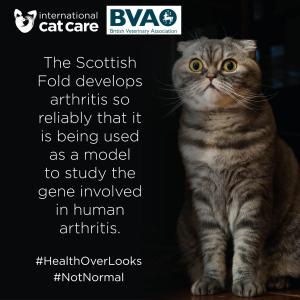
We believe that no animal should be born to suffer. Breeding animals purposely to have mutations that we know will definitely cause them pain and suffering throughout their lives is cruel, immoral and irresponsible. Not only that, but an animal suffering from serious medical problems is not a suitable family pet: any family adopting a Scottish Fold is signing up for a life of veterinary trips, medical treatments and medication. Watching a family pet spiral downwards into a life of pain and misery is clearly not what anyone is hoping for when choosing a cat.
If you already have a Scottish Fold, please do not be defensive of the breed. No doubt you were not properly informed of the implications that those ‘cute’ ears would have. Simply provide your cat with the best possible care you can and choose a different breed if you ever decide to welcome another cat into your home.
It is time to stop breeding for animals born to suffer, no matter how cute those animals might look. Choose health.
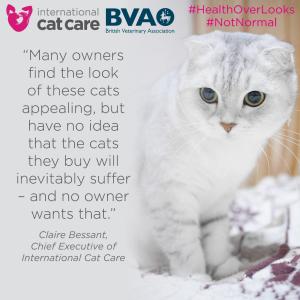
Cat breeds to avoid:
-
Scottish Folds (bone/cartilage problems)
-
Persians (breathing problems)
-
Exotic Shorthairs (breathing problems)
-
Munchkins or any other cat with shortened legs (dwarfism)
If you are choosing a cat breed, please have a look at these articles:
Choose a healthy cat breed
Choosing a healthy breed of cat will save you heart ache, time and a lot of money. It will also mean that you are not supporting the breeding of animals who are born to suffer.
Read more...
- Find out how often you should vaccinate your cat. You will be surprised at the latest research.
- Discover the best cat trees for your feline friend
British Shorthair kittens
- Find out if we have any British Shorthair kittens available by visiting our kitten page, or contacting us.